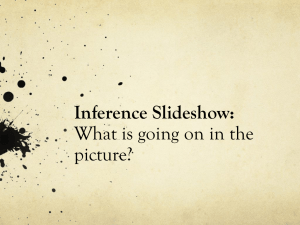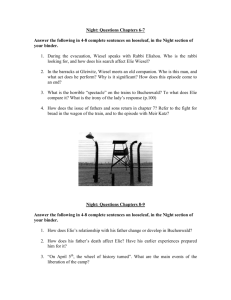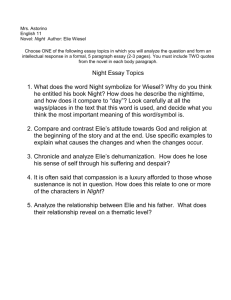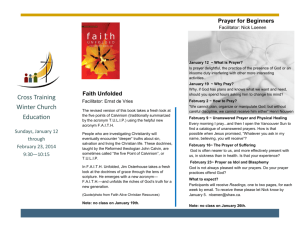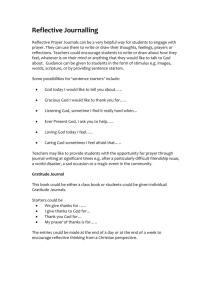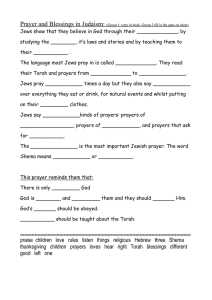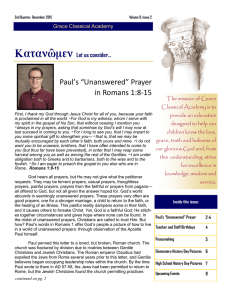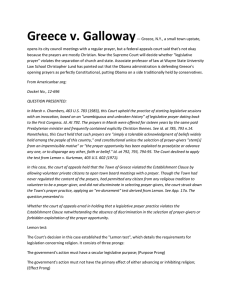When Reality and Tradition Clash
advertisement
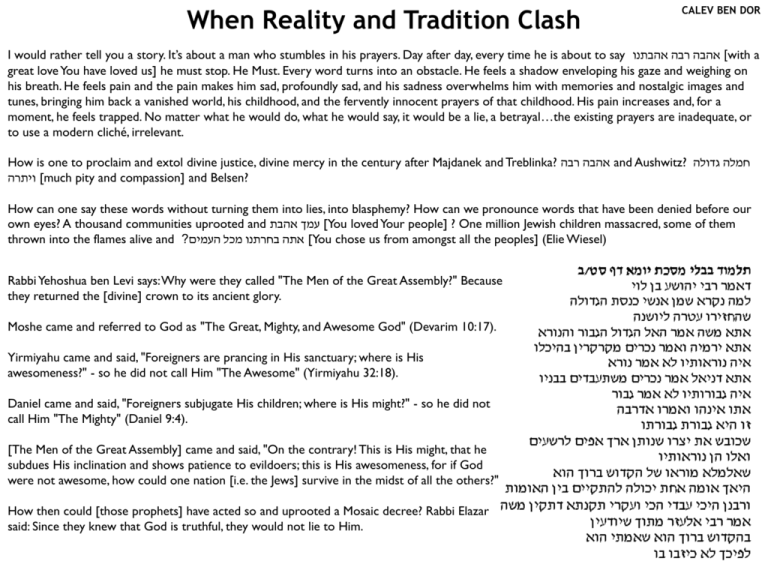
When Reality and Tradition Clash CALEV BEN DOR I would rather tell you a story. It’s about a man who stumbles in his prayers. Day after day, every time he is about to say ] אהבה רבה אהבתנוwith a great love You have loved us] he must stop. He Must. Every word turns into an obstacle. He feels a shadow enveloping his gaze and weighing on his breath. He feels pain and the pain makes him sad, profoundly sad, and his sadness overwhelms him with memories and nostalgic images and tunes, bringing him back a vanished world, his childhood, and the fervently innocent prayers of that childhood. His pain increases and, for a moment, he feels trapped. No matter what he would do, what he would say, it would be a lie, a betrayal…the existing prayers are inadequate, or to use a modern cliché, irrelevant. How is one to proclaim and extol divine justice, divine mercy in the century after Majdanek and Treblinka? אהבה רבהand Aushwitz? חמלה גדולה [ ויתרהmuch pity and compassion] and Belsen? How can one say these words without turning them into lies, into blasphemy? How can we pronounce words that have been denied before our own eyes? A thousand communities uprooted and [ עמך אהבתYou loved Your people] ? One million Jewish children massacred, some of them thrown into the flames alive and ?[ אתה בחרתנו מכל העמיםYou chose us from amongst all the peoples] (Elie Wiesel) Rabbi Yehoshua ben Levi says: Why were they called "The Men of the Great Assembly?" Because they returned the [divine] crown to its ancient glory. Moshe came and referred to God as "The Great, Mighty, and Awesome God" (Devarim 10:17). Yirmiyahu came and said, "Foreigners are prancing in His sanctuary; where is His awesomeness?" - so he did not call Him "The Awesome" (Yirmiyahu 32:18). Daniel came and said, "Foreigners subjugate His children; where is His might?" - so he did not call Him "The Mighty" (Daniel 9:4). [The Men of the Great Assembly] came and said, "On the contrary! This is His might, that he subdues His inclination and shows patience to evildoers; this is His awesomeness, for if God were not awesome, how could one nation [i.e. the Jews] survive in the midst of all the others?" How then could [those prophets] have acted so and uprooted a Mosaic decree? Rabbi Elazar said: Since they knew that God is truthful, they would not lie to Him. Horizontal / Vertical Meaning In the end he will say it. he will clench his teeth but he will say it. Because other Jews over there said it before him. No matter what, he feels he should not be the last in the chain: the adventure that Judaism is should not stop with him Now without his hesitation his prayer would be an act of complacency. With it, his prayer becomes an act of remembrance. Religious Rebellion He could rebel. Stop practicing – stop worshipping. And no one would have the right to reprimand him. The Jewish tradition, alone among all others, allows man to protest against heaven. From Abraham to Moses, from Jeremiah to Levi Yitzchak of Berditchev, there were many who questioned God and his peculiar presence in history. But one’s rebellion must be constant; meaning it must be renewed, re-examined, reaffirmed day after day, night after night. One must live one’s rebellion and not let it slide into indifference. One must say again and again, Ribbono Shel Olam, I know and you know that its time to pray…but I will not do you hear me, I will not. Whoever opts for such attitude and does so with sincerity, well, his no becomes a yes, and his refusal of prayer becomes…prayer (Elie Wiesel) Even a direct challenge is a form of engagement which is sometimes more intimate than the engagement of the museum curators who polish the glass of locked cases. Blashpemy is also part of Jewish tradition. As is heresy as is the condemnation of God. All these are indisputal religious positions. (Amos Oz - A Full Wagon an Empty Wagon) Reinterpretation to Maintain Meeting נער הייתי גם זקנתי ולא ראיתי צדיק נעזב וזרעו מבקש לחם Once I was young, and now I am old, yet I have never watched a righteous person forsaken nor his children begging for bread. I have translated it here according to a fine insight, author unknown, suggesting the word raiti should be understood in the sense in which it appears in the Book of Esther, when Esther, pleading on behalf of Jewry says ‘for how can I watch the evil that shall come upon my people? Or how can I watch the destruction of my kindred?’ (8.6) The verb there means ‘stand as a passive witness to’ Taken in this sense, Psalm 37.25 should be understood as ‘when the righteous was forsaken or his children forced to search for bread, I never merely stood and watched’ Understood thus, it is a warning against being a mere bystander while other people suffer. It thus brings the Grace to a symmetrical close; it began by speaking of God’s goodness in feeding the hungry, and ends with an injuction for us to do likewise. This too is part of ‘walking in God’s ways’ (Jonathan Sacks)
